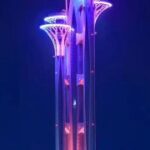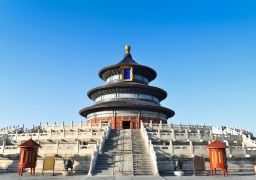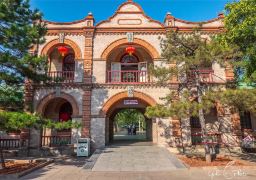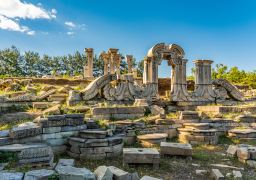Xi Si, from North First Alley to North Eighth Alley, consists of eight Hutongs that were part of the Mingyu Neighborhood during the Yuan and Ming dynasties, and later incorporated into the jurisdiction of the Zhenghong Banner during the Qing dynasty. The eastern end of the Hutongs, known as Xi Si North Street, was referred to as the ‘Great Market Street’ during the Ming and Qing dynasties. At the crossroads, there were four archways built in the Ming dynasty, hence the name ‘Xi Si Archways’. After the removal of the archways in 1954 to improve traffic, the intersection was renamed ‘Xi Si’.
At No. 39, Xi Si North Third Street, in the Xicheng District, is the residence of Cheng Yanqiu after 1937. Cheng Yanqiu (1904-1958), originally named Yanqiu, was of Manchu ethnicity and a native of Beijing. He was a renowned Peking Opera performing artist, one of the ‘Four Great Dan Actors’. Born into poverty, he was sold to learn the arts, initially studying martial roles, and later switching to the role of Qingyi. By combining traditional Peking Opera arts, guidance from Mr. Wang Yaoqing, and his unique vocal characteristics, he developed his own distinctive artistic style, known as the ‘Cheng School’. During the Anti-Japanese War, after the ‘July 7th Incident’, when Beiping fell, the Japanese forces demanded that the Peking Opera community in Beiping perform for the donation of airplanes. Many dared not refuse, but Cheng Yanqiu refused to perform. When advised not to resist, he stated: ‘I cannot perform for free for the Japanese to buy airplanes to bomb the Chinese. I, Cheng, would rather die than comply!’ To avoid harassment, he ceased performing and took to farming in Qinglongqiao on the outskirts of Beijing, living in seclusion. It was only after the liberation of Beiping that he returned to live in the city. No. 39, Xi Si North Third Street, is the first property Cheng Yanqiu bought in Beijing and also his seventh residence. After the founding of the People’s Republic of China, Mr. Yanqiu handed over all his properties to the state, including No. 39, Xi Si North Third Street, which was handed over twice. The full text’s opening hours and specific business status are subject to the actual opening conditions on the day.Xi Si: A Historical Hub of Beijing
Xi Si, from North First Alley to North Eighth Alley, consists of eight Hutongs that were part of the[...]









